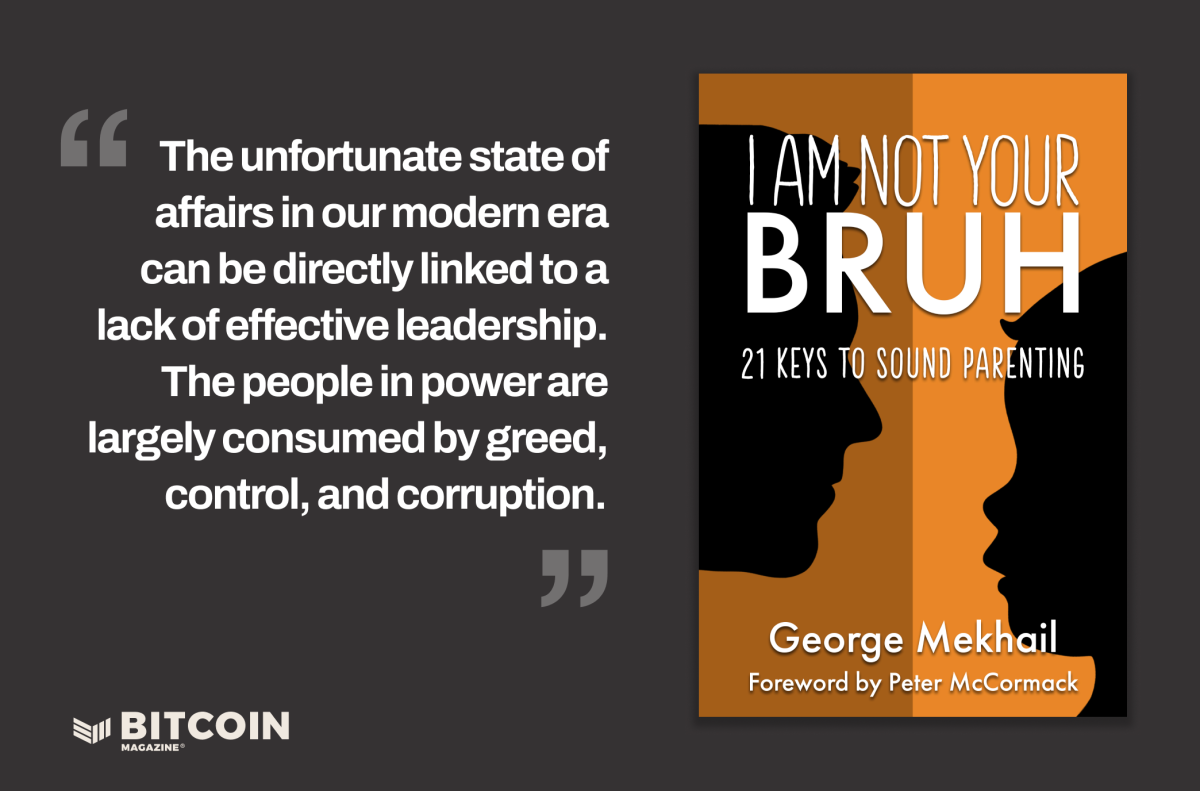The following is an excerpt from I Am Not Your Bruh: 21 Keys to Healthy Parenting by George Mechail. Visit the Bitcoin Magazine Store Order this book today!
I started using this phrase as the last thing I say to my kids when I send them off to elementary school, and I still use it today when they are getting ready to play with their friends or leave the house. Daniel and I often talk about how one of our main goals in parenting is to raise kids who will be leaders. The concept of leadership in our world has become somewhat elusive, if not downright elusive. Leadership is not the same as authority, nor is it the same as popularity. Just because you are the President of the United States does not make you a leader, or at least, a leader who can be emulated automatically. Being a celebrity is not synonymous with being a leader worth emulating. While many celebrities boast of being followed by countless “fans” on social media, having their every move watched in the tabloids, and even being hailed as role models, effective leadership has become the only thing in this world that is scarcer than Bitcoin.
The unfortunate situation of our time can be directly related to the lack of effective leadership. Those in power are consumed primarily by greed, control, and corruption. This is due in large part to a horribly misaligned incentive structure exacerbated by a broken monetary system. This system allows the rich to easily get richer and the corrupt to fuel their unchecked corruption. I will discuss this topic in more detail later, but the situation has gotten so bad that those in positions of power no longer care about appearances. They flaunt and mock oppression, as if to say, “What are you going to do?” I believe that part of the answer to this question requires fighting the long game through sound parenting. If the next generation of parents commits to the vision of raising the next generation of strong leaders, we will begin to make meaningful progress in humanity’s common struggle for the ideals of freedom, peace, and prosperity. Think of all the historical breakthroughs in times when humans have faced tyranny, fought back, and triumphed, and you will find examples of strong leadership. After all, someone has to raise the next George Washington. There is no reason why it shouldn’t be me or you.

Take Yourself Seriously
It’s funny when people say “don’t take yourself so seriously”. So how do I take myself? I’m a pretty easy going person and I like to make people laugh. I also have a positive attitude and a lot of hyperbole. Life is too short. I want you to grab every single one of your hopes and dreams and make them into reality. In that sense, I would say I take myself seriously. If you don’t take yourself seriously, don’t expect others to take you seriously either. What a shame to live this precious life. I say: Take yourself seriously. Aim high. Dream big. Fail often. Show up. Keep moving forward. Laugh out loud. Take risks. Be bold. Don’t hold back. And most importantly, teach your kids to do the same. Don’t listen to the insecurities of others who need you to cower in their boots so they can have confidence. Don’t stifle your dreams before they even have a chance to see the light of day. The world needs more boldness, more fearlessness, and more mavericks who aren’t afraid to stand up to bullshit. I can safely say that every legendary historical figure took themselves seriously, took their dreams seriously, and worked seriously. Don’t get me wrong, this is an active, ongoing decision that requires constant self-reflection and self-awareness. worry Don’t worry about what other people think of you. Every time you decide to take yourself seriously, you are taking a step toward not only achieving your goals, but fulfilling your God-given potential.
take responsbility on
Each of our lives can be boiled down to a series of decisions. Every day we are becoming someone, and the person we are becoming is shaped by the choices we make. In every situation we face, we can decide “how to get through this.” It is our reaction to every question: expected, fair, difficult. The truth is that each of us has the ability to evaluate these situations and determine the best course of action. The combination of using our abilities to respond appropriately points to one of the most beautiful words in the English language: responsibility. Seriously, take a moment to appreciate how rich this word is and how important it is in the game of life. To make good choices and be good leaders, we need to take responsibility. Teaching children how to take responsibility for their lives is a fundamental goal of quality parenting. A small step to achieving this outcome starts with helping them realize the real-world impact of every decision. And, broadening the scope even further, helping them understand how their current situation is a result of the numerous decisions they have already made. Certainly, everyone has different capabilities. And everyone has different means of response at their disposal. But by the same token, everyone has the opportunity to accept their own set of responsibilities based on a given situation. A hallmark of effective leadership is a willingness to take on more responsibility than is reasonably expected. Strong leaders crave responsibility and tend to actively seek it out. Similarly, they also tend to make wise, thoughtful, and deliberate decisions in every situation they face.
Conversely, poor decision making can also be described as an inability to respond effectively to a given situation. For fun, let’s say an inability to respond. This is a characteristic of not only poor leaders, but also sheeple, NPCs, and what we might call blind followers. Think about how many poor decisions are made as a result of “peer pressure” and “following orders.” This is not the type of child we are trying to raise. We want lions, not sheep. Sadly, the world is full of non-critical thinkers, who are raising non-critical thinkers who lack the tools to accept responsibility and would rather have someone else make the decision for them. Unfortunately, poor decisions tend to fester much faster than wise decisions. Once this momentum is set in motion, the results are addiction, pain, and ultimately regret.
I’ll be 80 and have no regrets
As far as we know, we only have one life. There is only one George Samir Naguib Mekhair Saad Nasir Masood. It would be nice to have one, but life does not have an undo button. You cannot redo your life. “No regrets at 80” is a cliché that I personally use, but have used to explain to my children the meaning and importance of careful decision making and counting the days left in life. We all have regrets. Things we wish we had done differently or wish we could have changed. I take the concept of regret as strictly describing something that literally cannot be changed. Often, the word regret is applied to situations that can actually be changed, but that change is very difficult or requires a lot of discomfort to achieve. Some people say, “I regret that my relationship with Justin did not work out,” but in reality, you can fix your relationship by picking up the phone and contacting Justin. You may not need to call her today, but before you turn 80, you may be able to remove at least one thing from your list of regrets. When I’m faced with an especially big decision, I recall this mantra to help me put my options into perspective: The question behind this phrase is, “If I decide to do X, what are the chances that I will regret this decision near the end of my life?”
Be aware that the idea of avoiding regret can become an unhealthy obsession and limit risk-taking and creativity. This is not what I am suggesting. Rather, we need to find a healthy balance when it comes to limiting situations that result in irreversible regret. Most importantly, teach your children the importance of decision-making early in life and help them understand how these decisions compound over time, like interest. The earlier children learn to take responsibility for every action in their life, the more mature, wise, and independent they will be. Good decisions lead to good character. Good character creates good leaders. Good leaders raise children who surpass themselves in every area. Because that was the goal all along.






